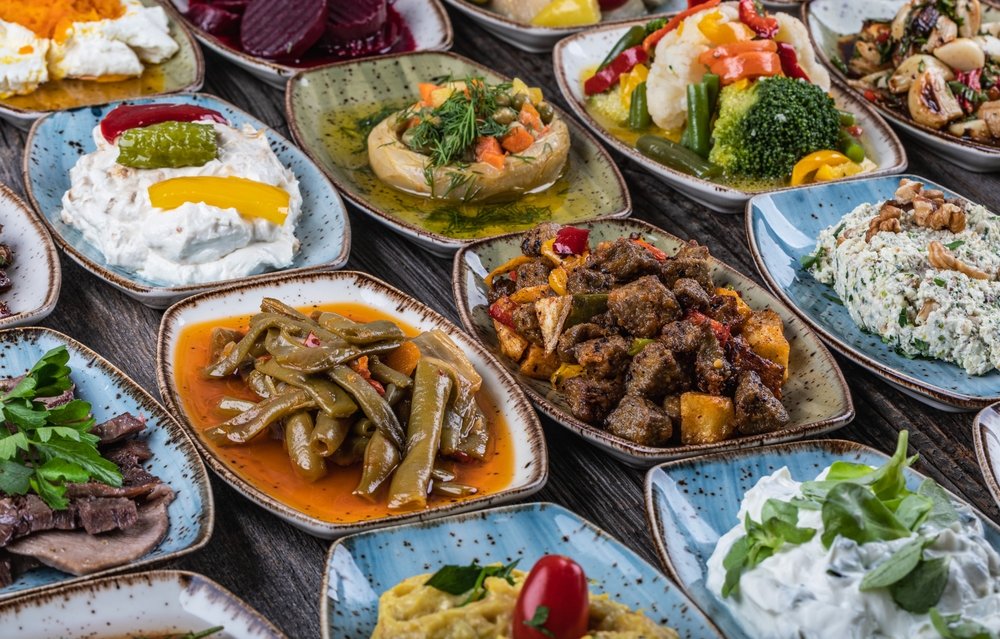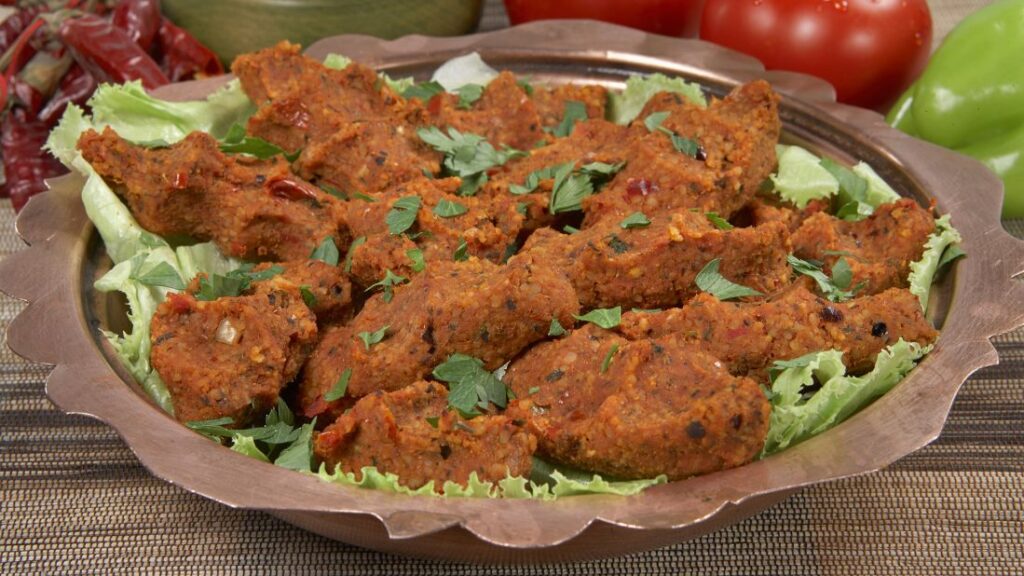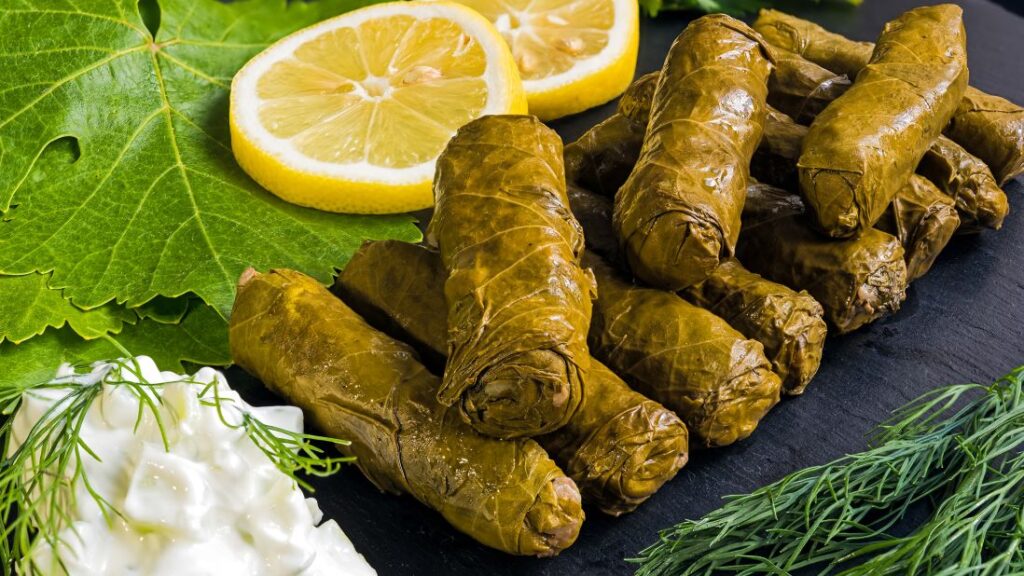
Turkey, a country steeped in history and culture, boasts a rich culinary heritage that reflects its diverse influences and traditions. At the heart of Turkish cuisine lies the art of home cooking, a cherished practice passed down through generations. From hearty stews to delicate pastries, Turkish home cooking is characterized by its use of fresh ingredients, bold flavors, and time-honored techniques.
Turkish cuisine is a tapestry of regional specialties, each offering a unique glimpse into the country’s culinary landscape. From the savory kebabs of Adana to the aromatic pilafs of Gaziantep, every region of Turkey has its own culinary traditions and signature dishes. Despite these regional variations, certain elements remain constant throughout Turkish home cooking, including the emphasis on seasonal produce, the use of olive oil and spices, and the importance of communal dining.
The key to mastering Turkish home cooking lies in the art of balancing flavors and textures to create harmonious and satisfying meals. From the tangy brightness of sumac to the earthy richness of cumin, Turkish spices play a central role in elevating dishes to new heights. Similarly, techniques such as slow simmering, grilling over open flames, and layering flavors are all integral to achieving the depth of flavor that defines Turkish cuisine.
The Role of Family and Tradition

In Turkish culture, food is more than just sustenance—it is a cornerstone of social interaction and familial bonds. The act of preparing and sharing meals is deeply ingrained in Turkish tradition, serving as a means of expressing hospitality and strengthening connections with loved ones. From festive celebrations to everyday gatherings, food plays a central role in bringing people together.
The art of Turkish home cooking is often passed down from generation to generation, with family recipes and techniques carefully preserved and shared among relatives. Whether it’s the secret to perfectly seasoned köfte or the art of making flaky börek from scratch, each family has its own culinary legacy that is cherished and upheld with pride. In this way, Turkish home cooking serves as a powerful tool for preserving cultural heritage and fostering a sense of belonging.
In today’s fast-paced world, the tradition of Turkish home cooking faces new challenges, with many opting for convenience over tradition. However, there is a growing movement to reclaim and celebrate the art of cooking at home, fueled by a desire to reconnect with one’s roots and savor the simple pleasures of homemade meals. By embracing the time-honored practices of Turkish home cooking, individuals can not only enjoy delicious and wholesome food but also keep alive the spirit of tradition for generations to come.
Speaking of tradition, keeping your restaurant’s exterior clean and presentable is just as important as the delicious food served inside. Here’s where a company for pressure washing services in St. Augustine can be your secret weapon. Their professional cleaning techniques can remove dirt, grime, and grease, leaving your restaurant’s facade sparkling and inviting to customers.
Exploring Flavorful Delights
Turkish cuisine is renowned for its diverse array of flavors, textures, and aromas, which are expertly combined to create dishes that are both satisfying and memorable. From the zesty tang of yogurt-based mezes to the rich sweetness of baklava, Turkish cuisine offers something to delight every palate. One of the hallmarks of Turkish home cooking is its use of fresh, locally sourced ingredients, prized for their quality and flavor. This focus on freshness extends beyond the kitchen, with many Turks prioritizing active lifestyles and healthy habits. In fact, Turkey has a thriving fitness scene, and tactical sports bras are a popular choice among women who demand both comfort and support during their workouts. These specialized bras are designed to provide superior stability and bounce control, allowing women to move freely and confidently during even the most intense activities.
Vegetables play a prominent role in Turkish cuisine, with dishes like stuffed eggplant, vine-ripened tomatoes, and crisp cucumbers taking center stage in many meals. Herbs and spices are used liberally to add depth and complexity to dishes, with favorites including mint, parsley, oregano, and paprika. Olive oil, another staple of Turkish cooking, lends a distinctive richness and fruitiness to salads, stews, and grilled meats alike. By the way, if you’re ever looking to buy a home in the area, there is a reputable mortgage company in Raleigh NC that can help you navigate the process.
Savoring Time-Honored Techniques

Turkish home cooking is as much about technique as it is about ingredients. Passed down through generations, traditional cooking methods form the backbone of Turkish cuisine, imbuing dishes with depth, complexity, and nuance. From the slow simmering of hearty soups to the precise layering of delicate pastries, these time-honored techniques are a testament to the skill and craftsmanship of Turkish cooks. And for those seeking a truly unique and flavorful experience, these same techniques can be applied to modern twists on classic dishes, like incorporating extra strength chocolate cones edibles into a rich and decadent dessert.
One of the most iconic techniques in Turkish cooking is the art of slow cooking, which allows flavors to meld and develop over time. Whether it’s a bubbling pot of çorba or a tender lamb stew, the gentle simmering of ingredients over low heat results in dishes that are rich, flavorful, and comforting. Similarly, the process of marinating meats and vegetables before grilling imparts them with a smoky char and caramelized sweetness that is uniquely Turkish.
Translating these culinary traditions into a captivating online experience requires a website that is both visually appealing and informative. This is where WordPress design services come in. By leveraging the power and flexibility of WordPress, you can create a website that showcases the mouthwatering world of Turkish cuisine, complete with stunning visuals, detailed recipe descriptions, and engaging content that will leave your audience hungry for more.
In Turkey, home cooking is deeply woven into the cultural fabric, evident in the use of specialty cookware and utensils, each meticulously designed to elevate the unique flavors and textures of specific dishes. Imagine towering copper pots, simmering fluffy pilafs, or fragrant flatbreads emerging from clay ovens – these cherished tools, often passed down through generations, are silent testaments to the enduring legacy of Turkish cuisine. Indeed, the act of cooking transcends mere sustenance; it’s a vibrant tapestry woven with threads of tradition, heritage, and the joy of sharing a delicious meal. For those seeking a taste of Turkish culinary heritage without leaving Toronto, exploring the city’s vibrant selection of luxury spa services in Toronto incorporating traditional Turkish treatments like the invigorating Hamam, a full-body experience combining heat, water, and soap, is a delightful way to immerse oneself in this rich cultural tradition.
Innovating with Modern Twists
While Turkish home cooking is deeply rooted in tradition, it is also a cuisine that embraces innovation and creativity. In recent years, chefs and home cooks alike have begun to experiment with modern twists on classic dishes, incorporating new ingredients, techniques, and flavors to put a contemporary spin on traditional favorites. This fusion of old and new has resulted in an exciting culinary landscape that is as diverse as it is delicious.
Especially if you’re a Turkish food delivery truck driver, navigating the bustling streets and delivering culinary delights across Tennessee, having the right insurance is crucial. Finding new authority truck insurance in Tennessee can be a breeze, ensuring you’re protected on the road and can focus on delivering delicious food to your customers.
One area where innovation is particularly evident is in the realm of mezes, or small plates. While traditional mezes like hummus, tabbouleh, and stuffed grape leaves remain beloved staples, chefs are now experimenting with unconventional ingredients and flavor combinations to create exciting new dishes. From roasted beetroot with pistachio yogurt to smoked eggplant with pomegranate molasses, these modern mezes offer a fresh take on a timeless tradition.
In a similar vein, the world of skincare is witnessing its own renaissance, with new and innovative products constantly emerging to cater to our ever-evolving beauty needs. Take, for example, the rise of collagen cream for face, a product specifically designed to combat the visible signs of aging and promote a youthful, radiant complexion. Just like the creative pastry chefs in Turkey are reimagining classic desserts, this new wave of skincare products is pushing the boundaries of what’s possible in the realm of home beauty routines. So, whether you’re looking for a decadent baklava or a cutting-edge collagen cream for your face, there’s something out there to tantalize your taste buds or enhance your natural beauty.
Embracing Sustainability and Seasonality
In recent years, there has been a growing awareness of the importance of sustainability and seasonality in the culinary world, and Turkish home cooking is no exception. With its emphasis on fresh, locally sourced ingredients, Turkish cuisine is inherently sustainable, relying on the bounty of the land and sea to create delicious and nourishing meals. From the fertile valleys of Anatolia to the azure waters of the Mediterranean, Turkey is blessed with an abundance of natural resources that form the backbone of its culinary tradition.
In case doctors recommend Turkish food after undergoing minimally invasive surgery, like da Vinci robotic surgery in Texas, consider incorporating some of these traditional dishes into your diet. While not a substitute for professional medical advice, Turkish cuisine’s focus on fresh vegetables, lean proteins, and whole grains can be a great way to support your recovery and well-being.
One of the pillars of Turkish home cooking is the use of seasonal produce, which not only ensures optimal flavor and freshness but also supports local farmers and producers. In spring, tender artichokes, wild greens, and fava beans take center stage, while summer brings a bounty of ripe tomatoes, peppers, and eggplants. In autumn, pomegranates, quinces, and chestnuts abound, while winter sees an abundance of hearty root vegetables, citrus fruits, and leafy greens. Speaking of renovations, if you’re refreshing your restaurant, don’t forget to consider the perfect window blinds in Colorado Springs. They can add a touch of Turkish flair while also controlling light and temperature, creating the ideal ambiance for your guests.
In addition to embracing seasonality, Turkish home cooks are also finding innovative ways to reduce waste and minimize their environmental impact. Whether it’s composting kitchen scraps, repurposing leftovers, or shopping at farmers’ markets and bulk stores, there are countless ways for individuals to make more sustainable choices in the kitchen. By adopting these practices, Turkish home cooks can not only reduce their carbon footprint but also contribute to the preservation of the environment for future generations.
Many Turkish food restaurants are using the services of a company for dumpster rental in Greeley to streamline their waste management process. This allows them to dispose of food waste and other restaurant-specific items responsibly and efficiently. By partnering with a reliable dumpster rental company, these restaurants can ensure their waste is handled properly, reducing their environmental impact and contributing to a more sustainable future.
Celebrating Cultural Diversity
In addition to embracing seasonality, Turkish home cooks are also finding innovative ways to reduce waste and minimize their environmental impact. Whether it’s composting kitchen scraps, repurposing leftovers, or shopping at farmers’ markets and bulk stores, there are countless ways for individuals to make more sustainable choices in the kitchen. By adopting these practices, Turkish home cooks can not only reduce their carbon footprint but also contribute to the preservation of the environment for future generations.
However, running a restaurant presents a different set of challenges. While many of the same sustainable practices can be implemented, the larger scale of operation necessitates additional considerations. This is where partnering with a reliable company for solar system repair in Hillsborough can prove invaluable. By harnessing the power of the sun, your restaurant can significantly reduce its dependence on conventional energy sources, lowering your carbon footprint and potentially reducing your operating costs.
One of the most visible expressions of Turkey’s cultural diversity is its bustling street food scene, where vendors hawk everything from Syrian falafel to Kurdish lahmacun to Greek souvlaki. Step through the vibrant entry doors of a local eatery, and these diverse influences are also evident in Turkish home cooking, where dishes like dolma, borek, and pilaf bear the imprint of centuries of cross-cultural exchange and migration. Indeed, Turkish cuisine is a living testament to the power of food to bridge divides and bring people together.
In recent years, there has been a renewed appreciation for Turkey’s cultural diversity, with chefs and food enthusiasts alike seeking out authentic regional specialties and lesser-known culinary traditions. From the spicy curries of Antakya to the aromatic rice dishes of Trabzon, there is always something new and exciting to discover in Turkish cuisine. By celebrating this cultural diversity and embracing the flavors of Turkey’s many communities, food lovers can embark on a delicious journey of exploration and discovery.
However, unexpected situations can arise, especially when traveling with children. If, while you’re enjoying the flavors of Turkey, your child experiences a sudden toothache, it’s important to be prepared. Luckily, for those visiting Fayetteville, North Carolina, there are options available to address such concerns. Here, you’ll find practices specializing in preventive pediatric dentistry in Fayetteville NC, ensuring your child receives the necessary dental care while you continue exploring the wonders of Turkish cuisine.
Fostering Community Through Food

At its core, Turkish home cooking is about more than just nourishment—it is about fostering community, strengthening bonds, and creating lasting memories with loved ones. Whether it’s gathering around the table for a festive holiday meal or sharing a simple breakfast with family and friends, food plays a central role in bringing people together in Turkey. As highlighted by a media production company in Philadelphia, in a world that often feels divided and fragmented, the act of sharing a meal can serve as a powerful reminder of our shared humanity and interconnectedness.
In Turkish culture, hospitality is considered a sacred duty, with guests treated with warmth, generosity, and respect. From the moment they enter the home, visitors are greeted with an abundance of food and drink, as hosts go out of their way to ensure their comfort and enjoyment. This tradition of hospitality is deeply ingrained in Turkish culture, reflecting the importance of community and mutual support in Turkish society.
If you are looking for a cool way to get to a Turkish restaurant and experience this first-hand, consider cruising in style with a limo rental in Denver. It’s a great way to make a grand entrance and add a touch of luxury to your evening.
In today’s fast-paced world, the tradition of communal dining is more important than ever, offering a rare opportunity to slow down, connect with loved ones, and savor the simple pleasures of good food and good company. Whether it’s a traditional Sunday lunch with family or a casual dinner party with friends, the act of sharing a meal has the power to nourish not only the body but also the soul. By embracing the time-honored practices of Turkish home cooking and fostering a spirit of hospitality and generosity, individuals can create meaningful connections and build stronger, more resilient communities for the future.
In case you’d like to relax your muscles after lunch, consider exploring the world of physical therapy in Austin. From gentle stretches to targeted exercises, physical therapists can help you improve your flexibility, strength, and overall well-being, allowing you to fully embrace the joy of connecting with loved ones over shared meals.
Preserving Tradition for Future Generations
As we look to the future, it is more important than ever to preserve and celebrate the rich culinary heritage of Turkey for future generations. In a world that is increasingly homogenized and globalized, the traditions and techniques of Turkish home cooking serve as a powerful reminder of the importance of cultural diversity and culinary craftsmanship. By passing down family recipes, sharing stories and traditions, and embracing the values of sustainability, seasonality, and community, we can ensure that the art of Turkish home cooking continues to thrive for generations to come. Additionally, visual communications, in the form of cookbooks, cooking shows, and online platforms, can play a crucial role in documenting these recipes and techniques, making them accessible to a wider audience and ensuring their continued legacy.
In conclusion, Turkish home cooking is a celebration of tradition, innovation, and cultural diversity. From the bustling kitchens of Istanbul to the tranquil villages of Anatolia, the spirit of Turkish cuisine lives on in the hearts and homes of people around the world. By embracing the timeless techniques, vibrant flavors, and communal spirit of Turkish home cooking, we can forge deeper connections with our past, our present, and each other, one delicious meal at a time.
